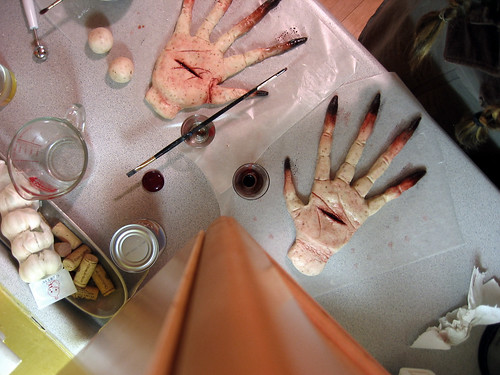Three years ago today I wrote the first post at I've Been Reading Lately. Nearly six hundred posts later, I can't think of a better way to mark the anniversary than to commemorate another, more impressive milestone: the publication of the fiftieth book under the Hard Case Crime imprint.
I discovered Hard Case Crime the same way a lot of readers did: through the extensive coverage of their publication of Stephen King's The Colorado Kid, which was the subject of one of my first posts. Three years and thirty-seven books later, I still look forward to the arrival of each month's new title in my mailbox.
The fiftieth book, Fifty-to-One, by founding editor Charles Ardai, starts with the ingenious premise that the occasion is the fiftieth anniversary of Hard Case Crime, and it follows the adventures of the line's founder, Charley Borden, along with a dancing girl from South Dakota newly landed in the big city and the mobsters on whose wrong side--a mile wide, unsurprisingly--they soon find themselves.
In addition, Ardai has given his novel another twist: it consists of fifty chapters, named after (and related to) the titles of each of the books in the series. Being familiar with the series, I found myself looking forward to how this Oulipian conceit would force Ardai to figure out ways to finagle his way around such unpromising titles as A Diet of Treacle, Lemons Never Lie, and Grave Descend; I particularly liked his solutions to David Dodge's Plunder of the Sun and the Robert Bloch two-fer Shooting Star/Spiderweb.
But the rules Ardai has set for himself are only part of the fun. As a celebration should, Fifty-to-One feels like a book that was as much fun to write as it is to read. Its ramshackle charms remind me of nothing so much as late-1930s Hollywood movies, wherein you get the sense that the filmmakers threw in everything they thought their audience would enjoy and assumed they'd keep up with the plot. Gunplay, romance, sharp dialogue, character actors--it's all here, along with a heist, some bookies, the FBI, and more. The heroine plays like a more innocent Barbara Stanwyck (which would make her, what, Claudette Colbert?), and the baddies arrayed against her could surely accommodate Edward G. Robinson and Sydney Greenstreet; meanwhile, Ardai has resisted the urge to cast the series's founder as a flawless, lantern-jawed leading man, leaving him instead in the nebbishier reaches of the previously unexplored nexus between Ugarte and Han Solo.
As the pleasantly wild plot ticks through its surprises, we're also treated to a loving reconstruction of the seedier side of 1958 New York City, its racetracks and nightclubs, subways and taxicabs--Ardai even takes a few well-deserved shots at evil old Robert Moses. The most fun, though, are the cameos, from an violent Mickey Spillane to the wryly comic young writers Donald Westlake and Lawrence Block, who serve as a sort of pulp Bert and Ernie--or, more accurately, Ernie and Ernie.
Unapologetically a romp, Fifty-to-One carries none of the seriousness or psychological weight of the novels Ardai has written under the pen name of Richard Aleas, the second of which, Songs of Innocence, is one of the best crime novels I know. But it's a sheer joy to read, and a worthy celebration of a series that has brought me countless pleasure over the past three years.
Congratulations on reaching fifty, Hard Case. Here's to fifty more good years to come.
I've Been Reading Lately is what it sounds like. I spend most of my free time reading, and here's where I write about what I've read.
Tuesday, November 18, 2008
Sunday, November 16, 2008
"Tom detested murder unless it was absolutely necessary."
From Ripley's Game (1974), by Patricia Highsmith
Meanwhile, to follow an afternoon spent tidying up with Ripley, Samuel Pepys has a solid suggestion for how we might spend our evening. From his diary entry for November 15, 1665:
Tom hated the Mafia, hated their loan-sharking, their blackmail, their bloody church, their cowardlinesss in forever delegating their dirty work to underlings, so that the law couldn't get its hands on the bigger bastards among them, never get them behind bars except on charges of income tax evasion or some other triviality. The Mafiosi made Tom feel almost virtuous by comparison.What better reward for a morning of rigorous house-cleaning than an afternoon spent with the deliciously creepy Tom Ripley? In Ripley's Game, Tom finds himself a bit ennui-ridden . . . so he engages in some acts of violent altruism--which leave him, to no reader's surprise, with some bodies to dispose of. "Oh," laments a woman who unwillingly gets sucked into the mess, "it's the money, it's the corpses." To which, after my morning of cleaning, I couldn't help but add, "It's the scrubbing the blood off the floor."
Meanwhile, to follow an afternoon spent tidying up with Ripley, Samuel Pepys has a solid suggestion for how we might spend our evening. From his diary entry for November 15, 1665:
I made them, against their resolutions, to stay from houre to houre till it was almost midnight, and a furious, darke and rainy, and windy, stormy night, and, which was best, I, with drinking small beer, made them all drunk drinking wine, at which Sir John Robinson made great sport. But, they being gone, the lady and I very civilly sat an houre by the fireside observing the folly of this Robinson, that makes it his worke to praise himself, and all he say and do, like a heavy-headed coxcombe.For those of you who follow Pepys's example and find yourselves greeting the office Monday morning wearing the grisly rictus and hooded eyes of overindulgence, the last lines of that day's entry may serve to remind you that it could certainly be worse. Whatever its cruelties, a hangover is not the plague:
The plague, blessed be God! is decreased 400; making the whole this week but 1300 and odd; for which the Lord be praised!Hear, hear.
Friday, November 14, 2008
"Mr. Holmes, they were the footprints of a gigantic hound!"
In anticipation of Pierre Bayard's Sherlock Holmes Was Wrong: Reopening the Case of "The Hound of the Baskervilles" (2008), I spent today reading Conan Doyle's most famous long-form Holmes tale. On opening the novel, I quickly realized that I'd not even looked at it since childhood, when I devoured a poorly illustrated (and quite possibly abridged) edition; all these years later, the very word "moor" still strikes me as sinister.
This time, however, I turned to The New Annotated Sherlock Holmes (2006), the beautifully produced and thoroughly wonderful complete edition of Holmes that W. W. Norton published a couple of years ago, about which I've written a bit before.
While I find editor Leslie Klinger's notes, which range from simple explanations of terms and period detail to more abstruse theorizing that draws on the best of Sherlockian scholarship, to be a sheer joy, rocketlass can't quite bear them. When I'm reading Holmes aloud on a car trip, and I start to read her a note like this one--
Sometimes, however, I can't resist. I read The Hound by myself, but I flagged the following note to share, which I'm confident will amuse her. When Watson discovers Holmes's spartan hiding place on the moor, he notes that Holmes
Klinger's notes also do good work in situating each Holmes story in relation to the others, both in a purely Sherlockian sense--where do they fit in the Canon--and in a more general sense, tracking themes, word choices, and images. Klinger even draws, to good effect, from Conan Doyle's non-Holmes work, as in the following passage from Rodney Stone (1896), which Klinger uses to illustrate the dissolute public life of Regency England. In a scene that, were it just a tad more ridiculous, could come from Wodehouse, the title character's uncle explains why he gave up duelling
This time, however, I turned to The New Annotated Sherlock Holmes (2006), the beautifully produced and thoroughly wonderful complete edition of Holmes that W. W. Norton published a couple of years ago, about which I've written a bit before.
While I find editor Leslie Klinger's notes, which range from simple explanations of terms and period detail to more abstruse theorizing that draws on the best of Sherlockian scholarship, to be a sheer joy, rocketlass can't quite bear them. When I'm reading Holmes aloud on a car trip, and I start to read her a note like this one--
In "The Railways of Dartmoor in the Days of Sherlock Holmes," B. J. D. Walsh concludes that Watson and company would have taken either the 10:30 or the 10:35 to Exeter, arriving at 2:28 P.M., where they would have had to change for the Coombe Tracey (which Walsh identifies with Bovey Tracey) on the Moretonhampstead branch. Although there was a slower train at 11:45, only by taking the 10:30 or the 10:35 could they have had the chance of obtaining lunch at Exeter.--rather than admiring the confluence of two areas of intense, nerdy devotion (railroads and Holmes stories), she simply rolls her eyes and asks me to move on.
Sometimes, however, I can't resist. I read The Hound by myself, but I flagged the following note to share, which I'm confident will amuse her. When Watson discovers Holmes's spartan hiding place on the moor, he notes that Holmes
had contrived, with that cat-like love of personal cleanliness which was one of his characteristics, that his chin should be as smooth and his linen as perfect as if he were in Baker Street.To which Klinger appends the following note, retailing a theory that, though it may be common currency among Sherlockians, surely leaves the more casual fan a bit gobsmacked:
Noting the absence of shaving gear, C. Alan Bradley and William A. S. Sarjeant point to this as one of the strongest pieces of evidence for their thesis that Holmes was a woman. But Wason never mentions a Sherlockian beard, and Ron Miller, in "Will the Real Sherlock Holmes Please Stand Up?," suggests that his jaw was hairless, revealing American Indian ancestry.Since Klinger has used the term already, I can't help but suggest that, if Holmes is a woman pretending to be a man, his Sherlockian beard would surely be the fascinatrix Irene Adler?
Klinger's notes also do good work in situating each Holmes story in relation to the others, both in a purely Sherlockian sense--where do they fit in the Canon--and in a more general sense, tracking themes, word choices, and images. Klinger even draws, to good effect, from Conan Doyle's non-Holmes work, as in the following passage from Rodney Stone (1896), which Klinger uses to illustrate the dissolute public life of Regency England. In a scene that, were it just a tad more ridiculous, could come from Wodehouse, the title character's uncle explains why he gave up duelling
"A painful incident happened the last time that I was out, and it sickened me of it."Having certain poorly suppressed dandyish tendencies myself, I can fully sympathize with the poor man. A wound will heal, but a ruined coat is lost forever.
"You killed your man--?"
"No, no, sire, it was worse than that. I had a coat that Weston has never equalled. To say that it fitted me is not to express it. It was me--like the hide on a horse. I've had sixty from him since, but he could never approach it. The sit of the collar brought tears into my eyes, sir, when first I saw it; and as to the waist--
"But the duel, Tegellis!" cried the Prince.
"Well, sir, I wore it at the duel, like the thoughtless fool that I was. It was Major Hunter, of the Guards, with whom I had had a little tacuasserie, because I hinted that he should not come into Brookes's smelling of the stables. I fired first, and missed. He fired, and I shrieked in despair. 'He's hit! A surgeon! A surgeon!' they cried. 'A tailor! A tailor!' said I, for there was a double hole through the tails of my masterpiece. No, it was past all repair. You may laugh, sir, but I'll never see the like of it again."
Wednesday, November 12, 2008
"Seduction is to do and say the most banal thing in the most banal way."
A couple of weeks ago, Maud Newton wrote about a remarkable mid-air romantic entanglement she witnessed while flying back from England. At the time, I was in the middle of yet another re-reading of Anthony Powell's A Dance to the Music of Time, and though Maud didn't offer much detail, the situation she described--to say nothing of the sort of people whom one imagines might maneuver themselves into such an illicit encounter--was so full of comic potential that I started wondering what Powell might have made of it. When I found myself standing in the kitchen unable to follow a recipe because I was busy constructing Powellian sentences in my head, I decided that I had to take a crack at writing the scene as I imagined Powell might have done.
The resulting Powell pastiche is up at Maud's blog now. I hope Powell fans will enjoy it, though I warn them in advance that my hold on Powell's cadences and sensibility slips now and then, giving way to a sub-Wodehousian jokiness. I fear that Powell himself might be offended and decide to haunt me--though what form would that haunting take? Surely he would do little more than sit in a chair, observing, asking the occasional question; maybe he'd occasionally disarrange my books?
I took the headline of this post from Powell's A Writer's Notebook, which is a trove of apothegms and insights. Below are a couple that I wish I'd been able to fit into the story of the inflight romance:
The resulting Powell pastiche is up at Maud's blog now. I hope Powell fans will enjoy it, though I warn them in advance that my hold on Powell's cadences and sensibility slips now and then, giving way to a sub-Wodehousian jokiness. I fear that Powell himself might be offended and decide to haunt me--though what form would that haunting take? Surely he would do little more than sit in a chair, observing, asking the occasional question; maybe he'd occasionally disarrange my books?
I took the headline of this post from Powell's A Writer's Notebook, which is a trove of apothegms and insights. Below are a couple that I wish I'd been able to fit into the story of the inflight romance:
The nearest some women get to being faithful to their husbands is being disagreeable to their lovers.And when what they want is to join the mile-high club, really, who is a fellow passenger to deny them that pleasure?
People usually do what they want.
Monday, November 10, 2008
The Part about What Doesn't Fit in a Review

{Photos by rocketlass.}
After all that dithering, I finally wrote a review of Roberto Bolaño's posthumous brick of a novel 2666. It's up at the Front Table blog of the Seminary Co-Op Bookstore (the bookstore of choice for our incoming First Family!).
Since I finished my review, I've read a handful of other reviews, and what's been most striking is the way they collectively demonstrate the capaciousness of the novel: each emphasizes some different aspect, and hardly any of us draw on more than one or two of the same quotations in the course of describing and appraising the book. All of which makes me think a brief collection of odds and ends, half-formed thoughts that didn't make it into the review, may be warranted.
1 Adam Kirsch is right in his review for Slate:
It is a shame for a reviewer to have to reveal even the outlines of these stories: The best way to experience 2666 is without warning, as in a dream in which you find yourself on a road that could lead absolutely anywhere.So if you're a Bolaño fan, I recommend bookmarking this and the other reviews to read when you're all done. And have rested.
2 More than in any others of his novels I've read, Bolaño in 2666 explicitly takes up and repudiates the idea of the detective novel--a form that I assume he must have loved. Throughout the novel, we get hints that Bolaño is eventually going to offer us answers to the many questions he raises, and, more important, a solution to the murders at the center of the book. Anyone who's read Bolaño before knows deep down that such a resolution is unlikely--incompleteness is his metier--but, especially when in the company of a couple of characters who fancy themselves detectives, we again and again find ourselves sucked into the delusion that the world can be put to rights if only we can find the answer.
Which, in a way, is similiar to Bolaño's greatest overall achievement as a writer, the sense he gives that his entire fictional universe, big and messy and incomplete, could just maybe be understood if only we could find the key, tilt our brains at the right angle, peer through the right scrim. We can't help but imagine that it's like what one of the critics from the novel's first section found in his hotel bathroom:
In Pelletier's bathroom the toilet bowl was missing a chunk. It wasn't visible at first glance, but when the toilet seat was lifted, the missing piece suddenly leaped into sight, almost like a bark. How the hell did no one notice this? wondered Pelletier.But as Bolano himself is always at pains to remind us, "Behind every answer lies a question." The reverse is never true, is it?
2 The novel's fourth section, "The Part about the Crimes," is unquestionably the dark heart of the book, its reason for being. I write about it at length in my review, arguing that it's a challenge to the reader, a demand that we not turn away from evil, madness, and suffering. In its depiction of brutality and horror, "The Part about the Crimes" is the direct opposite of something like the Saw franchise: films like that challenge us not to be squeamish--to tamp down our natural reactions and feelings enough to keep watching atrocities; 2666 asks us to fully feel, yet look anyway, because this is the way our species lives.

3 In his review of 2666 for the New York Times Book Review, Jonathan Lethem notes,
Bolaño seems to make sport of violating nearly all of the foremost writing-school rules, against dream sequences, against mirrors as symbols, against barely disguised nods to his acquaintances, and so on.To that you can add his repeated violation of the overplayed "show-don't-tell" dictum. Bolaño loves to deliver thumbnail sketches of characters, often assembled with a bit of whimsy, telling us essential and pointless information all in a jumble, but leaving us at the end with a good sense of the person he's invented. This passage, introducing one of the literary critics from the novel's first part, is a particularly good example:
Liz Norton, on the other hand, wasn't what one would ordinarily call a woman of great drive, which is to say that she didn't draw up long- or medium-term plans and throw herself wholeheartedly into their execution. She had none of the attributes of the ambitious. When she suffered, her pain was clearly visible, and when she was happy, the happiness she felt was contagious. She was incapable of setting herself a goal and striving steadily toward it. At least, no goal was appealing or desirable enough for her to pursue it unreservedly. Used in a personal sense, the phrase "achieve an end" seemed to her a small-minded snare. She preferred the word life, and, on rare occasions, happiness. If volition is bound to social imperatives, as William James believed, and it's therefore easier to go to war than it is to quit smoking, one could say that Liz Norton was a woman who found it easier to quit smoking than to go to war.He also likes to relate the impressions characters make on one another, with this account of Amalfitano, the madman of the book's second part, offering a good example, giving at the same time a hint of the apocalyptic language that suffuses the book:
The first impression the critics had of Amalfitano was mostly negative, perfectly in keeping with the mediocrity of the place, except that the place, the sprawling city in the desert, could be seen as something authentic, something full of local color, more evidence of the often terrible richness of the human landscape, whereas Amalfitano could only be considered a castaway, a carelessly dressed man, a nonexistent professor at a nonexistent university, the unknown soldier in a doomed battle against barbarism, or, less melodramatically, as what he ultimately was , a melancholy literature professor put out to pasture in his own field, on the back of a capricious and childish beast that would have swallowed Heidegger in a single gulp if Heidegger had had the bad luck to be born on the Mexican-North American border.

4 Individual lines jump out of the 900 pages of the book like true jewels, epigrams cryptic, gnomic, savage, and unforgettable--too long to Twitter, too short to leave drowning in the sea of the novel. Like this frozen moment from the time when Amalfitano's wife was slowly, repeatedly deciding to leave him:
Another time he found her sitting on a seafront bench at La Concha, at an hour when the only people out walking were two opposite types: those running out of time and those with time to burn.Or this metaphor to explain metaphor, tinged as it is with crazy:
Metaphors are our way of losing ourselves in semblances or treading water in a sea of seeming. In that sense a metaphor is like a life-jacket. And remember, there are lifejackets that float and others that sink to the bottom like lead. Best not to forget it.Or this seemingly personal statement on authorship:
Every minor work has a secret author and every secret author is, by definition, a writer of masterpieces. Who writes the minor work? A minor writer, or so it appears. . . . The person who really writes the minor work is a secret writer who accepts only the dictates of a masterpiece.2666 is a novel whose length, detail, and relentlessness force the reader into a sort of trance-like submission for stretches--but then without warning Bolaño jerks us back to full attention with a moment of flawless craft. He has created the inverse of a horror film, where the horror is constant enough to numb and the release comes in the occasional pulling back to the possible perfections of a moment, embodied in the craft of language. "A horror film," thinks one character, "where everything has come to a halt, and it comes to a halt because it knows it's lost."
5 And then there's this:
"We've gotten used to death," he heard the young man say.Though it's been more than five years since Bolaño's death, those of us who have only recently begun to explore his world are barely beginning to realize what we've lost. The white-haired man may be right, but he's also dead wrong.
"It's always been that way," said the white-haired man, "always."
Labels:
2666,
Adam Kirsch,
Jonathan Lethem,
Roberto Bolano,
Seminary Co-op
Saturday, November 08, 2008
The best-laid plans

{Photo by rocketlass.}
Entering the weekend, I had set aside today to work on a review of Roberto Bolano's 2666 that I'm supposed to turn in Monday for the Seminary Co-op Bookstore's blog. The book is so rich and impressive that I figured it would take me a whole day to write about it with any authority.
Then I made the mistake of reading the first couple of pages of Tom Rob Smith's Child 44. Hours later, I've written nary a word of the Bolano review and have about a hundred pages to go in Child 44.
This is why one should never allow crime novels to enter the house!
Labels:
2666,
Child 44,
crime novels,
Roberto Bolano,
Tom Rob Smith
Friday, November 07, 2008
The proper study of a president

{Photo by rocketlass.}
A final election-related reading post, then I’ll return to my usual mishmash of Samuel Johnson, crime novels, Anthony Powell, and such.
Just before the election, Scott McLemee of Inside Higher Ed asked a group of scholars to suggest reading material for the incoming president. Eric Rauchway, a historian whom you may know from his blog, The Edge of the American West, responded by urging Barack Obama to read Isaiah Berlin’s essay on Franklin Delano Roosevelt. Since Eric knows more about the (First?) Great Depression than almost anyone else, I took this as the excuse I’d been waiting for to pick up Berlin’s The Proper Study of Mankind: An Anthology of Essays (1997), which contains the FDR piece. The whole essay is well worth reading (which has been true of every bit of Berlin’s writing that I’ve encountered over the years), and you should go buy the book posthaste.
That call to action will serve as my admittedly weak compensation for the copyright laws I’m about to break. One portion of the essay—far too long to qualify for my calling this reprinting fair use—is of particular interest in the situation we now find ourselves in, making the transition from George W. Bush to Barack Obama. See if Berlin's description of one type of political leader, exemplified by Woodrow Wilson, brings any particular president to mind:
Indeed he was very different from Wilson. For they represent two contrasting types of statesman, in each of which occasionally men of compelling stature appear. The first kind of statesman is essentially a man of single principle and fanatical vision. Possessed by his own bright, coherent dream, he usually understands neither people nor events. He has no doubts or hesitations and by concentration of will-power, directness and strength he is able to ignore a great deal of what goes on outside him. This very blindness and stubborn self-absorption occasionally, in certain situations, enable him to bend events and men to his own fixed pattern. His strength lies in the fact that weak and vacillating human beings, themselves too insecure or incapable of deciding between alternatives, find relief and peace and strength in submitting to the leadership of a single leader of superhuman size, to whom all issues are clear, whose universe consists entirely of primary colours, mostly black and white, and who marches towards his goal looking neither to right nor to left, buoyed up by the violent vision within him. Such men differ widely in moral and intellectual quality, and, like forces of nature, do both good and harm in the world. To this type belong Garibaldi, Trotsky, Parnell, de Gaulle, perhaps Lenin too--the distinction I am drawing is not a moral one, not one of value but one of type. There are great benefactors, like Wilson, as well as fearful evil-doers, like Hitler, within this category.Hmm. How many days until he vacates the White House?
Then take a look at the second type. The fit isn’t perfect, but I do see similarities to what we can know so far of Barack Obama’s leadership style:
The other kind of effective statesman is a naturally political being, as the simple hero is often explicitly anti-political and comes to rescue men, at least ostensibly, from the subtleties and frauds of political life. Politicians of this second type possess antennae of the greatest possible delicacy, which convey to them, in ways difficult or impossible to analyse, the perpetually changing contours of events and feelings and human activities round them--they are gifted with a peculiar, political sense fed on a capacity to take in minute impressions, to integrate a vast multitude of small evanescent unseizable detail, such as artists possess in relation to their material. Statesmen of this type know what to do and when to do it, if they are to achieve their ends, which themselves are usually not born within some private world of inner thought, or introverted feeling, but are the crystallisation, the raising to great intensity and clarity, of what a large number of their fellow citizens are thinking and feeling in some dim, inarticulate, but nevertheless persistent fashion. In virtue of this capacity to judge their material, very much as a sculptor knows what can be moulded out of wood and what out of marble, and how and when, they resemble doctors who have a natural gift for curing, which does not directly depend upon that knowledge of scientific anatomy which can be learned only by observation or experiment, or from the experiences of others, though it could not exist without it. This instinctive, or at any rate incommunicable, knowledge of where to look for what one needs, the power of divining where the treasure lies, is something common to many types of genius, to scientists and mathematicians no less than to businessmen and administrators and politicians. Such men, when they are statesmen, are acutely aware of which way the thoughts and feelings of human beings are flowing, and where life presses on them most heavily, and they convey to these human beings a sense of understanding their inner needs, of responding to their own deepest impulses, above all of being alone capable of organising the world along lines which the masses are instinctively groping for. To this type of statesman belonged Bismarck and Abraham Lincoln, Lloyd George and Thomas Masaryk, perhaps to some extent Gladstone, and to a minor degree Walpole. Roosevelt was a magnificent virtuoso of this type, and he was the most benevolent as well as the greatest master of his craft in modern times.I don’t mean to push this too far in seriousness--and I’m not sure by any means that this is what Eric was aiming for in suggesting the essay to Obama--but given that I’m still enjoying the afterglow of Tuesday’s events, I’m willing to temporarily allow myself to dream absurdly big. Another FDR would sure be nice.
{Side note: the comparison to Czech statesman Thomas Masaryk should be of particular interest for University of Chicago folks, as Masaryk is honored on the campus with a statue of a Bohemian guardian knight of legend who stares protectively down the length of the Midway.}
In case the perceptiveness and finely crafted prose of Berlin’s essay hasn’t yet convinced you to you to buy The Proper Study of Mankind, I’ll salve my conscience for my copyright abuse by closing with another great line, one that could serve as a pithy account of the essential questions that drove Berlin’s thought. It comes from his 1990 essay “The Pursuit of the Ideal”:
Only barbarians are not curious about where they come from, where they are, where they appear to be going, whether they wish to go there, and if so, why, and if not, why not.This has been a good week for thinking about those sorts of questions; the next time we gather as a nation to make this choice, maybe we’ll have some better answers to all of them.
Wednesday, November 05, 2008
Overwhelmed
Martin Luther King Jr., from "Where Do We Go From Here?", a speech to the Southern Christian Leadership Conference on August 16, 1967:
Really, nothing captures it so well as the two photos below, taken by my friend Sandy at the moment when CNN called the race.


{Photos by santheo, used under a Creative Commons license.}
As Barack Obama emphasized in his speech, last night marked the beginning more than the end. It was the end of a campaign that began, for a lot of us, in the shadows of November 3rd, 2005, but it was just the start of the incredibly long to-do list facing us as a nation. The lolObama that my friend Jeremy made today says it all:

At the same time, the events of yesterday deserve a couple of days of heartfelt celebration--so I think it's only right that this post end on a lighter, more cheerful note, supplied by rocketlass. Great patriot that she is, she chose not only to wear her red, white, and blue dress to the rally last night, but to spend her L ride down there reading some of Roosevelt's fireside chats. When I met up with her on my return from canvassing in Indianapolis, almost the first thing she did was point out the following passage from the chat of May 7, 1933:
I must confess, my friends, the road ahead will not always be smooth. There will be still rocky places of frustration and meandering points of bewilderment. There will be inevitable setbacks here and there. There will be those moments when the buoyancy of hope will be transformed into the fatigue of despair. Our dreams will sometimes be shattered and our ethereal hopes blasted. We may again with tear-drenched eyes have to stand before the bier of some courageous civil rights worker whose life will be snuffed out by the dastardly acts of bloodthirsty mobs. Difficult and painful as it is, we must walk on in the days ahead with an audacious faith in the future. . . . When our days become dreary with low-hovering clouds of despair, and when our nights become darker than a thousand midnights, let us remember that there is a creative force in this universe, working to pull down the gigantic mountains of evil, a power that is able to make a way out of no way and transform dark yesterdays into bright tomorrows. Let us realize the arc of the moral universe is long but it bends toward justice.I've been having a hard time today finding words to describe the stream of emotions provoked by last night's party in Grant Park. Hope. Love. Relief. Pride. Kinship. Towering patriotism.
Really, nothing captures it so well as the two photos below, taken by my friend Sandy at the moment when CNN called the race.


{Photos by santheo, used under a Creative Commons license.}
As Barack Obama emphasized in his speech, last night marked the beginning more than the end. It was the end of a campaign that began, for a lot of us, in the shadows of November 3rd, 2005, but it was just the start of the incredibly long to-do list facing us as a nation. The lolObama that my friend Jeremy made today says it all:

At the same time, the events of yesterday deserve a couple of days of heartfelt celebration--so I think it's only right that this post end on a lighter, more cheerful note, supplied by rocketlass. Great patriot that she is, she chose not only to wear her red, white, and blue dress to the rally last night, but to spend her L ride down there reading some of Roosevelt's fireside chats. When I met up with her on my return from canvassing in Indianapolis, almost the first thing she did was point out the following passage from the chat of May 7, 1933:
In addition to all this, the Congress also passed legislation as you know authorizing the sale of beer in such states as desired it. That has already resulted in considerable reemployment, and incidentally it has provided for the federal government and for the states a much-needed tax revenue.So in the spirit of FDR, and in the full appreciation of the public works funded by my liquor taxes, I raise a glass tonight to Barack Obama--along with, always and forever, Abraham Lincoln and Martin Luther King, and all the brave souls who came between them--and of course to the United States of America.
Tuesday, November 04, 2008
The big day

{Photo by rocketlass.}
If I'd had a bit more time this week, I would have been ready for this day with some Thomas Paine or something from my beloved Abraham Lincoln. Instead, I'm in Indianapolis to help get out the vote for Obama, and all I have to offer from the conjunction of literature and politics is this line from the journals of Jules Renard, who was not just a writer, but also the mayor of his small hometown in France:
As mayor, I am supposed to look after the maintenance of the rural roads; as a poet, I like them better neglected.Here's hoping for good news tonight.
Sunday, November 02, 2008
The Dangers of the Doctor

{Photo by rocketlass.}
I spent last week reading Peter Martin's new biography of Samuel Johnson and James Boswell's old one on alternating halves of my daily commute. As I flagged pages and noted passages, I quickly discovered that it would be very easy to accidentally turn this blog into Apposite or Amusing Things Said or Written by Dr. Johnson that I've Been Reading Lately. Such as this:
It is laudable in a man to wish to live by his labours; but hs should write so as he may live by them, not so as he may be knocked on the head.Or, speaking of a "dull tiresome fellow":
That fellow seems to me to possess but one idea, and that is a wrong one.Or, from a letter to Joseph Baretti, this apology for not having written sooner:
Yet it must be remembered, that he who continues the same course of life in the same place, will have little to tell. One week and one year are very like another. The silent changes made by time are not always perceived; and if they are not perceived, cannot be recounted.Those lines alone would be sufficient to make the letter memorable, but Johnson outdoes himself later:
Those who have endeavoured to teach us to die well, have taught few to die willingly; yet I cannot but hope that a good life might end at last in a contented deathFortunately--because, however domineering the great man's mind and personality may have been, this blog is not supposed to be all about Dr. Johnson--those lines about death reminded me of a couple of thoughts from Jules Renard. In his journal, Renard takes death less seriously than Johnson, though this first jotting could be read as at least half-lament:
Please, God, don't make me die too quickly! I wouldn't mind seeing how I die.This last one, however, is little more than an amusing thought, simultaneously a wry acknowledgment of Renard's age and a smirk at the fashionable fatalism of youth:
I am no longer capable of dying young.A fine thought with which to escape the shadow of Johnson for a few hours, and on which to end a Halloween weekend. Back to your graves, ghoulies. See you next year.
Labels:
James Boswell,
Jules Renard,
Peter Martin,
Samuel Johnson
Friday, October 31, 2008
"When years come upon you, you will find that poring over books will be an irksome task."

{Photos by rocketlass.}
The headline of this post comes from an admonition that Samuel Johnson reportedly received from an old man at Oxford in 1763 who urged him, "Ply your book diligently now," before old age robbed him of his thirst for knowledge. Johnson, forever afraid of his natural indolence, took the urging to heart, making up a plan; here's how Peter Martin explains it in his thoughtful and well-written new Samuel Johnson: A Biography (2008):
On 21 November 1729, in an effort to get down to study, he made a self-disciplining table of how much reading he could get done in a week, month and year if he read ten pages per day: 60, 240, and 2880 respectively. To begin with a meagre ten pages per day may suggest just how indolent he thought he had become. He soon realized that ten pages per day would get him nowhere, so he tabulated what he could achieve based on 30, 50, 60, 150, 300, 400 and 600 per day, though he did not take the last four as far as computing annual totals, realising the stark fantasy in such an exercise. Sixty would yield 17,280 for a year, and apparently he thought that was as much as he could realistically read. Such computations would become almost chronic with him as he struggled to impose order on a sense of disorder, "as it fixed his attention steadily upon something without, and prevented his mind from preying upon itself." He even counted the number of lines to be read in The Aeneid and other works by Virgil, as well as in works by Euripides, Horace, Ovid, Theocritus and Juvenal.I remember making calculations of that sort when I was a teenage boy who loved math and ordered systems; the tendency reappears now and then in my adult life, usually when I'm contemplating a seemingly insurmountable stack of pages requiring careful proofreading. For the most part, though, I'm satisfied these days with making some progress on one or two of the several books I'm always lugging with me on my commute, numbers and plans be damned.
Given my recent preoccupation with the copious quantities of unread matter lining the walls (and, let's be frank piled on the floor) of my house, it probably won't surprise you that I was struck by Johnson's approach to the problem. More troubling, however, for the bibliophile surrounded by books, is this account later in the biography of the fate of Edward Harley, the cataloging of whose vast library Johnson took on as paid work in his pre-Rambler, pre-Dictionary years:
Harley, friend of Pope and son of Robert Harley the Tory Lord Treasurer in the reign of Queen Anne, was owner of the great estate of Wimpole Hall in Cambridgeshire. He owned a vast collection of books, manuscripts, and tracts that he housed at Wimpole Hall, his house in Dover Street, and his magnificent mansion in Cavendish Square. The size of the collection included some fifty thousand books and seven thousand volumes of manuscripts, not to mention coins, engravings, Greek and Roman antiquities, and more than five hundred paintings.That doesn't sound bad, does it? So what's the problem, you ask? Why does this book blogger, who mere months ago broke down and bought all-new bookcases, feel a chill wind sweep over him on reading about Harley? Because Martin goes on to explain:
His need to build elegant places to house them eventually brought on severe financial worries that may have hastened his death.If you need me, I'll be over here, culling my shelves for donations to the Chicago Public Library.

Thursday, October 30, 2008
Mere coincidence . . . or eerie coincidence?

{Photo by rocketlass.}
You might want to dim your lights for this one. Maybe open the window a crack to let in the October chill. Pull the blanket a bit closer, warm your brandy, put another log on the fire, that sort of thing. Are you sure you threw the deadbolt?
Monday, as I was reading James Boswell's Life of Johnson, I encountered this bit of doggerel from, as Boswell terms him, "the very ingenious Mr. Didben":
A Matrimonial ThoughtMy first thought on reading that (other than to think how glad I was not to be Mr. Didben's poor wife) was that it sounded like the kernel of a story that John Collier might cook up in conjunction with Robert Arthur. A harridan of a wife who drives her husband to murder . . . but then he finds he has to murder her again and again and again--seems like just their kind of story.
In the blithe days of honey-moon,
With Kate's allurements smitten,
I lov'd her late, I lov'd her soon,
And call'd her dearest kitten.
But now my kitten's grown a cat,
And cross like other wives,
O! by my soul, my honest Mat,
I fear she has nine lives.
Two days later, I received in the mail an old copy of Alfred Hitchcock Presents Stories for Late at Night (1961), which I'd ordered following James Hynes's enthusiastic recommendation at his blog. Though I'd known that Robert Arthur had served as editor for the great anthologies aimed at children that were published under Hitchcock's name in the 1960s (and that I read multiple times when I was kid in the '80s), it hadn't occurred to me that he'd probably played the same role in the creation of the adult Hitchcock anthologies of the period as well. But on opening this volume, I encountered the following note, which I think one wouldn't be faulted for assuming understates the case:
The editor gratefully acknowledges the invaluable assistance of Robert Arthur in the preparation of this volume.If Arthur didn't get quite the credit he most likely ought to have for his editorial work on Stories for Late at Night, it was made up for by the placement of his own story "Death Is a Dream" at the opening of the collection.
Which brings us back around to our starting point, the wife with nine lives: "Death Is a Dream" is about a man whose wife returns from the grave . . . so he kills her . . . but then has to kill her yet again! "I fear she has nine lives," indeed.
What was that? You say you heard something? A sound at the window? Oh, I'm sure it was nothing. Nothing at all. . . . After all, who on earth would be out there on this blustery October night?
Tuesday, October 28, 2008
Is there no joy in Joyland?

{Photo by rocketlass.}
I recently mentioned that I'd taken on the job of Chicago editor for Joyland, a hub for short fiction. As such, I'm responsible for publishing one or two stories each month from writers who live in or have lived in Chicago.
The first story under my editorship went up last night: "Insult," by Joseph Clayton Mills. Hope you enjoy it.
I'm still taking submissions; if you meet the criterion and have a good story, drop me a line at the e-mail address in my Blogger profile. I got a great batch of stories after my initial notice, some of which I'm sure will turn up at Joyland in the coming months, but I'm always ready to look at more.
As for the headline of this post: all but two of the stories I received after my initial call for submissions involved a suicide. Of the remaining two, one made up for that deficiency with a murder. Is this indicative of a prevailing Windy City gloom? Should I worry? Could it be possible that even Mayor Daley suffers dark nights of the soul?
Monday, October 27, 2008
Getting lost in October Country

{Photo by rocketlass.}
Every October, I do my best to spend at least some time reading stories of ghosts, haints, fetches, ghouls, and other unpleasant manifestations. This October has, sadly, found me too busy to get very far in that project, so that all I have to share right now is a bit from a letter from Penelope Fitzgerald to her editor Mandy Kirkby of May 19, 1995, collected in the wonderful So I Have Thought of You: The Letters of Penelope Fitzgerald:
The ghost at the Southwold-Walberswick crossing is said to be a mother waiting for her child who was supposed to be coming back on the last ferry. The white dog, which I have actually seen, was something to do with Dunwich, I think, and the poltergeist was horrid.This is one of those occasions that makes one wish that collections of letters as a matter of course incorporated both sides of the correspondence. What did Kirkby ask to elicit this response? Readers of Fitzgerald's The Bookshop will recognize the poltergeist (and not be surprised that the ghost in the novel, convincingly eerie, was drawn from life), while the ferry ghost seems pretty straightforward--but what was the white dog? And what were the circumstances of Fitzgerald's sighting of it? I've written before about a certain matter-of-factness the English seem to bring to relations the appearance of the presumably ghostly, and this seems a perfect example.
But for those intrepid readers who are not English, and who refuse to simply accept intrusions from the unlikely spirit world as commonplace, that little taste of ghostliness will surely not be enough. Fortunately, prompted by Maud Newton, James Hynes has put together a list of ten great scary stories at his blog. The ones I already know are frightening and uncanny enough that later this week I'll be making the effort to seek out the rest.
And if that list doesn't include enough scares for you, you're welcome to dip into the I've Been Reading Lately archives and enjoy my numerous ghost-and-goblin posts from last October. Or you can simply reflect at length on various Sarah Palin-as-President scenarios . . .
Friday, October 24, 2008
"Light up you li'l ol' bug o' lightning"
In response to my mention of Johnny Mercer's "Glow-Worm" in yesterday's post, Patrick Kurp of the wonderful Anecdotal Evidence sent me a link to this clip of the Mills Brothers performing the song on "The Nat King Cole Show":
The performance is enthusiastic, yet retaining an element of cool. The smile on Donald's face when he takes the lead seems fully genuine: these guys are having fun with this song.
Gene Lees's biography of Mercer, Portrait of Johnny (2004), offers this account of the writing of "Glow-Worm" from singer Betty Bennett:
The performance is enthusiastic, yet retaining an element of cool. The smile on Donald's face when he takes the lead seems fully genuine: these guys are having fun with this song.
Gene Lees's biography of Mercer, Portrait of Johnny (2004), offers this account of the writing of "Glow-Worm" from singer Betty Bennett:
When I was singing with the Alvino Rey band, we had a vocal group called the Blue Reys. Because we recorded for Capitol, Johnny was going to do a tune with us. He was writing special lyrics to "Glow-Worm." We met with him and rehearsed the tune, the first two choruses. But there was a chorus missing. So he said, "Wait a minute, I'll run down to my offiec, I think it's on my desk." So he was gone fifteen minutes and came back with a wonderful lyric--having just written it.Not to question Ms. Bennett, or to criticize one of my favorite songwriters, but if the verse she's referring to is this one--
Glow little glow-worm, turn the key on--well, let's just say I bet Mercer had better fifteen-minute inspirations over the years. Yet the essential silliness of the lyrics doesn't really matter: "Glow-Worm" is an utter trifle, some fun wordplay serving as an excuse to trot out a nice little jump beat, but like so many Mercer songs, once you hear it, it stays with you.
You are equipped with taillight neon
You got a cute vest-pocket Mazda
Which you can make both slow and fazda
I don't know who you took a shine to
Or who you're out to make a sign to
I got a gal that I love so
Glow little glow-worm, glow
Put on a show worm
Glow little glow-worm, glow
Thursday, October 23, 2008
Breaking: Book Boy Blinks, Baseball Bests Blogging!

{Photo by rocketlass.}
Even though the half of this year's World Series is being played in a ballpark more suited to a spring-training split-squad scrimmage, if not tractor pulls and dental conventions, we're still watching. And between the demands of chili-making and Fox Sports-booing, my blogging time is severely constrained. So for today I'll simply share a questionable bit of natural history that I came across yesterday in James Boswell's Life of Johnson, appropriate for this time of year in that it features reflections on hibernation.
Johnson, writes Boswell,
seemed pleased to talk of natural philosophy. . . . "Swallows certainly sleep all the winter. A number of them conglobulate together, by flying round and round, and then all in a heap throw themselves under water, and lye in the bed of a river."This next has nothing to do with the season, but I can't help but share it:
He told us, one of his first essays was a Latin poem upon the glow-worm. I am sorry I did not ask where it was to be found.Much as I enjoy Johnson, a bit of Latin juvenilia couldn't possibly be as much fun as Johnny Mercer's take on the same animal:
Glow little glow-worm, glow and glimmerThere's more, including a rhyme so ridiculous it's charming, between "Mazda" and "fazda," here.
Swim through the sea of night, little swimmer
Thou aeronautical boll weevil
Illuminate yon woods primeval
See how the shadows deep and darken
You and your chick should get to sparkin'
I got a gal that I love so
Glow little glow-worm, glow
Labels:
baseball,
James Boswell,
Johnny Mercer,
Samuel Johnson
Tuesday, October 21, 2008
"We inherited from him early his abounding sense of the possibilities of the countryside."
In response to my post last week about the shared desire of Thomas Hardy and Wendell Berry to preserve rapidly disappearing rural ways of life, Frank Wilson of Books, Inq. commented,
At the same time, however, neither man denies the pleasure to be had in good company while you're working with your hands. It's a feeling I know from the work I did as a boy on farms, and as a young man in food service and the retail trade: when you're performing straightforward manual tasks, your mind--and your conversation--can roam free in a way that even the best office life can't replicate.
Tess offers some great examples of both aspects of manual labor. While Tess find little but happiness--despite the early hours and tiring work--at the dairy where she begins her working life, at the farm where she labors later she finds toil at its most draining. The following scene is a good example: Tess and her fellow laborers are working with the itinerant owner of a rudimentary steam-powered threshing machine hired by the farmer. Because the machine's time is precious, the farmer forces them to take advantage of the full moon and keep working through the night until the hayrick has been completely threshed. Night wears on:
The idealization of country life seems to be about as old as literature. But it is the work of writers, who have a tendency to airbrush out the grinding poverty and back-breaking labor that went with pastoral scenes. Which is not to say that I do not find myself susceptible to such idealization.It's a sensible response to a post in which I confessed to finding Berry's and Hardy's visions of rural life seductive, but fairness to both authors dictates that I make clear that they actually spend a lot of time chronicling the hard work necessitated by such a life. In fact, they're two of the best writers about work, period, that I know.
At the same time, however, neither man denies the pleasure to be had in good company while you're working with your hands. It's a feeling I know from the work I did as a boy on farms, and as a young man in food service and the retail trade: when you're performing straightforward manual tasks, your mind--and your conversation--can roam free in a way that even the best office life can't replicate.
Tess offers some great examples of both aspects of manual labor. While Tess find little but happiness--despite the early hours and tiring work--at the dairy where she begins her working life, at the farm where she labors later she finds toil at its most draining. The following scene is a good example: Tess and her fellow laborers are working with the itinerant owner of a rudimentary steam-powered threshing machine hired by the farmer. Because the machine's time is precious, the farmer forces them to take advantage of the full moon and keep working through the night until the hayrick has been completely threshed. Night wears on:
By degrees the freshest among them began to grow cadaverous and saucer-eyed. Whenever Tess lifted her head she beheld always the great upgrown straw-stack, with the men in shirt-sleeves upon it, against the gray north sky; in front of it the long red elevator like a Jacob's ladder, on which a perpetual stream of threshed straw ascended, a yellow river running up-hill, and spouting out on the top of the rick.The threshing concludes in a scene that can only be horrifying to our modern eyes, but was simply an accepted part of the job in nineteenth-century Dorset: the hubbub that ensues when the work reveals the layer of live rats at the bottom of the hayrick.
The time for the rat-catching arrived at last, and the hunt began. The creatures had crept downwards with the subsidence of the rick till they were all together at the bottom, and being now uncovered from their last refuge they ran across the open ground in all directions, a loud shriek from the by-this-time half-tipsy Marian informing her companions that one of the rats had invaded her person--a terror which the rest of the womeon had guarded against by various schemes of skirt-tucking and self-elevation. The rat was at last dislodged, and, amid the barking of dogs, masculine shouts, feminine screams, oaths, stampings, and confusion as of Pandemonium, Tess untied her last sheaf; the drum slowed, the whizzing ceased, and she stepped from the machine to the ground.Writing about farm life as lived nearly a century later, Wendell Berry, too, conveys both its responsibilities and rewards. The former is summed up nicely in this paragraph from the funny and moving story "Never Send a Boy to Do a Man's Work":
Carter Keith was a good father. He kept Athey with him as much as his work and, later, Athey's schooling would alow. The Keith place was always asire with work in those days. Everybody on the place would be up and the men and boys at the barns while the stars still shone, and at work by first light. Carter Keith followed the rules that he handed on to his son: He made use of all the daylight he had and would ask no man to do anythign that he would not do himself. His tenants and hands knew this and so respected him, and they worked hard.While these passages from "Where Did They Go?" offer a small glimpse of the pleasures of manual labor in a crew:
Though talking put Leaf to extreme effort, tightening the cords of his neck, when he sang his voice came sweet and free. To hear him stop talking, which he seldom did, and start to sing "The Wabash Cannonball or "Footprints in the Snow" always seemed a sort of miracle to me, as if a groundhog had suddenly soared into the air like a swallow. . . . It was pretty work when you had time to think about it, and weren't too tired to care. We drew the white-stemmed, green-leafed plants out of the moist ground of the beds, and laid them neatly in bushel baskets and old washtubs. R. T. hauled them to the patch where the setter crew spaced them out in the long rows. They would wilt in the heat that day, but by the next morning or the next, they would be stickign up again, pert and green and orderly, in the dew-darkened ground. Each night when we quit, Jake would say to me, fairly singing: "We're getting it done, Andy boy! We're leaving it behind!"And that "leaving it behind," I can tell you from walking beans as a teenager, is one of the best feelings in the world.
Sunday, October 19, 2008
"He was committed to the tactical clarity of eradicating mystery," or, Finding the right crime novel
Feeling a bit drained by my most recent immersion in the world of Anthony Powell's A Dance to the Music of Time, what I need now is the literary equivalent of a snack--something I can gleefully, heartily enjoy in a single sitting. I find myself in the deplorable state of having no unread Parker novels in the house, but I do have a small stack of recent Hard Case Crime novels to choose from. Time to try some opening lines.
First up is The First Quarry (2008), by Max Allan Collins, which relates the origin of Collins's hit man anti-hero. The first line:
So we move on to The Max (2008), by Ken Bruen and Jason Starr:
That leaves us with David J. Schow's Gun Work (2008):
Mere pages later, we get this passage:

{Photo by rocketlass.}
But as a fixer for the sort of dangerous mess Schow's describing, one's wife would seem to be categorically excluded from consideration, so rocketlass is out. Should I call Tony? Bob? Ed? Amy?
Oh, what am I saying? I need to try to strike up a friendship with this guy.
First up is The First Quarry (2008), by Max Allan Collins, which relates the origin of Collins's hit man anti-hero. The first line:
The night after Christmas, and all through the house, it was colder than fuck.About as hard-boiled as you can get, no? And with bonus swearing. But I recently read (and enjoyed) Lawrence Block's Hit and Run (2008), about his hit man anti-hero John Keller, and though I've never really considered the question before, a one-hit-man-novel-per-month rule seems reasonable.
So we move on to The Max (2008), by Ken Bruen and Jason Starr:
"Gonna have your sweet white ass later."Opening a crime novel with vicious dialogue is a solid move. In this case it's particularly good, because those of us who've read the first two Bruen and Starr black comedies know that the line is being addressed to the odious, ridiculous Max Fisher, a small-time hood with destructive delusions of grandeur--who when last we saw him was on his way to federal prison. But as much brutal, disreputable fun as The Max promises, I'm not sure that it's right to follow Anthony Powell's dry wit with Bruen and Starr's grotesquerie.
That leaves us with David J. Schow's Gun Work (2008):
How Barney came to occupy a room on the wrong side of management in a hostage hotel deep inside Mexico City had to do with his friend Carl Ledbetter and one of those scary phone calls that come not always in the middle of the night, but whenever you are most asleep and foggy.Aha. That's the one: the sentence that grabs you by the collar and drags you along, ignoring your protests, until it's finished with you. I think this is what I was looking for.
Mere pages later, we get this passage:
Now, rate your friends, your acquaintances and your intimates. Among that group you already know which person you'd ask for help when shady badstuff rears up in your life. Yeah, that one--the person you always suspected was a bit illicit, a hair violent, two baby steps beyond the law. After-hours help, a less-than-kosher midnight run, some muscle, maybe some payback, and you know the person you'd call when quiet society says you should be calling a cop.So who would I call? If I needed helpers for a stylish heist, I'd call rocketlass and Carrie, no question.

{Photo by rocketlass.}
But as a fixer for the sort of dangerous mess Schow's describing, one's wife would seem to be categorically excluded from consideration, so rocketlass is out. Should I call Tony? Bob? Ed? Amy?
Oh, what am I saying? I need to try to strike up a friendship with this guy.
Friday, October 17, 2008
Thomas Hardy and Wendell Berry

{Photos of Dorsetshire by rocketlass.}
When I went to shelve Tess of the D'Urbervilles tonight I realized that I first needed to add one more post to the string inspired by my recent re-reading of this most heartfelt of Thomas Hardy's novels.
I wrote a bit already about Hardy's tinkering with the text between the novel's first appearance in 1891 in the Graphic and its inclusion in the Wessex edition of his works in 1912. The most obvious and important changes Hardy introduced were to the relationship between Tess and Alec, but another set of alterations seems worth noting, particularly for a reader coming to the book more than a century later. As David Skilton, editor of the 1978 Penguin Classics edition, explains,
On the whole there is an increase in dialect and colloquialism in the dialogue between the 1891 and 1912. . . . The spoken language is generally rather neater, more economical, and less "literary" in the later version.The increased employment of dialect, alongside the occasional added reference to some old country practice--such as Angel Clare's wearing of a cabbage leaf under his hat to keep cool, which only appears in the 1912 edition--suggests that Hardy revised with an eye towards preserving details of a way of life that, in the decades since Tess's first publication, had almost entirely disappeared.
Even at the time of writing, Hardy was aware that the old country ways, having held from time immemorial, were slipping away, obsolescent in the face of the machine age. Late in the novel Hardy writes of the increasing hubbub of Old Lady-Day, when farm laborers who want to change situations moved to their new homes:
These annual migrations from farm to farm were on the increase here. When Tess's mother was a child the majority of the field-folk around Marlott had remained all their lives on one farm, which had been the home also of their fathers and grandfathers; but latterly the desire for yearly removal had risen to a high pitch.At the same time, Hardy explains, the villages were also being depopulated, their non-farm residents--carpenters, smiths, and other skilled workers--were being forced out; when their leaseholds expired, which often happened on the death of the head of the family, their cottages were torn down, the land beneath them going under the plow. As Hardy explains,
These families, who had formed the backbone of village life in the past, who were the depositaries of the village traditions, had to seek refuge in the large centres; the process, humorously designated by statisticians as "the tendency of the rural population towards the large towns," being really the tendency of water to flow uphill when forced by machinery.

That passage, written in close to a pure editorial voice, reminds me of Wendell Berry, who takes on the same mission of preservation in his novels. Berry draws on more than a century of unbroken chains of story and memory to recall rural life as it was lived in the years just before and after World War II, when the largely self-contained, pre-petroleum economy still held sway in the more remote hill farms of Kentucky. Berry's belief in that mostly lost way of life as more sustainable, human, and fulfilling than our contemporary industrial culture is implicit in all his fiction, echoed in the relationships of characters to one another and to the land, and in his emphasis on the importance of stewardship in all our interactions.
Berry makes those points explicit in his non-fiction, as in this passage from his essay "People, Land, and Community," collectd in The Art of the Commonplace:
People are joined to the land by work. Land, work, people, and community are all comprehended in the idea of culture. These connections cannot be understood or described by information--so many resources to be transformed by so many workers into so many products for so many consumers--because they are not quantitative. We can understand them only after we acknowledge that they should be harmonious--that a culture must either be shapely and saving or shapleless and destructive. To presume to describe land, work, people, and community by information, by quantitites, seems invariably to throw them into competition with one another. Work is then understood to exploit its people. And then instead of land, work, people, and community, we have the industrial categories of resources, labor, management, consumers, and government. We have exchanged harmony for an interminable fuss, and the work of culture for the timed and harried labor of an industrial economy.It was only when I read Wendell Berry, more than a decade after I left my rural birthplace for Chicago, that I understood how my hometown, like the smaller farming communities around it, had entered upon the decline that, by the time I left, had trimmed its population and largely shuttered its downtown. Berry's accounts, in fiction and nonfiction, showed me what those towns had been as recently as a generation ago, and it made me ache for their loss in a way I never had when I lived there.
The city is my home, and I love it far too much to ever want to leave it, but through Berry's eyes I finally saw what a small town could be even now, if propelled by a dynamic, decidedly local economy. It's a seductive vision, and one that I think Thomas Hardy would recognize and approve.

Wednesday, October 15, 2008
In which I demonstrate my ridiculousness in two ways, conveniently photographed (as is so much of my ridiculousness), by rocketlass.

Books do furnish a bag
That is a photo of the contents of my shoulder bag as they looked on my trip to work the first two days of this week. The sane will note that the mini-library pictured is a bit more comprehensive than round-trip commute of two hours would warrant. To which charge my only defense is that each morning as I packed the books I was telling myself that--all appearances to the contrary--I was merely dipping into, rather than actually re-reading, A Dance to the Music of Time, and thus needed to have a lot of other options to hand.
The reality, harder to escape with each turned page, was that of course I was re-reading Dance; fortunately, so far as self-deception goes, the consequences of this feeble pretense were relatively mild, felt only in my aching shoulders.

Flags do furnish a book
For this battered, beflagged galley copy of Roberto Bolano's 2666 I can offer no defense beyond a legitimate, somewhat fuddled effort to grapple with Bolano's talent. So much to note, so much that I might want to cite in my eventual review of the novel, such a mess my good intentions have made.
Which all leads me to this line from The Journal of Jules Renard, which is also somewhere in the shoulder bag:
Every time I want to settle down to work, literature gets between.Ain't that the truth.
Subscribe to:
Posts (Atom)